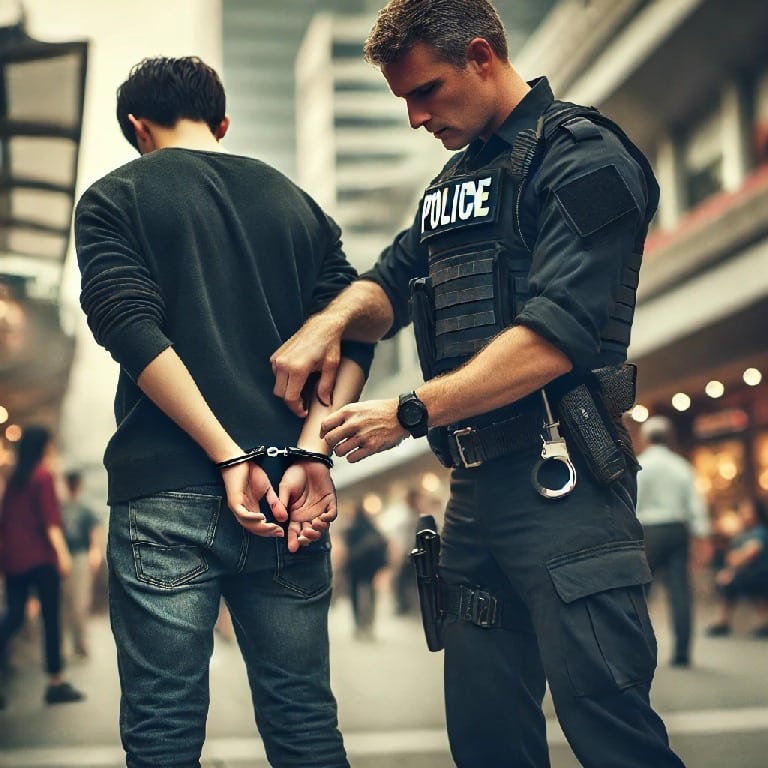Ever wonder what allows a police officer to arrest someone in Florida? It’s more complex than you might think. Like the Florida penal code, Florida’s laws set clear arrest rules.
In Florida, police have a lot of power to arrest. They can stop someone if they think a crime has happened. This belief, called probable cause, is key for many arrests.
It might surprise you that police don’t always need a warrant to arrest someone. In Florida, they can be arrested without a warrant in some cases. This includes breaking protective orders or having illegal guns if there’s an order against you.
Contents
Probable Cause in Florida Arrests
Probable cause is key in Florida’s criminal justice system. It prevents police from making arrests without a good reason and protects the rights of those being arrested.
Definition of Probable Cause
Probable cause means a strong belief that a crime is happening or will happen. In Florida, police need probable cause to arrest someone without a warrant. This belief is stronger than a guess but not as strong as being sure.
Legal Repercussions of Probable Cause
When probable cause exists, officers can:
- Make arrests without a warrant
- Get search warrants
- Do searches in certain situations
An arrest’s lack of probable cause might break the suspect’s rights. This could mean the evidence found is thrown out.
Differences Between Probable Cause and Reasonable Suspicion
Probable cause and reasonable suspicion are not the same:
- Probable cause means a firm belief a crime happened
- Reasonable suspicion allows for short stops and small searches
- Probable cause is needed for complete arrests and searches
When Can A Police Officer Arrest A Suspect In Florida?
The state has rules about when officers can arrest people, with or without a warrant. We’ll look at these situations and how arrests are done.
Arrests for Crimes Committed in Officer’s Presence
In Florida, officers can arrest someone immediately if they see a crime. This is true for both serious and minor offenses. For example, if an officer sees someone carrying a hidden weapon or causing trouble in a licensed place, they can arrest them immediately.
Warrantless Arrests in Specific Situations
In some cases, Florida also lets officers arrest people without a warrant, even if they didn’t see the crime. This includes things like domestic violence, child abuse, or breaking protective orders. In 2024, twenty-two types of crimes let officers arrest without a warrant for misdemeanors. Officers must have good reason to make these arrests.
Arrests Based on Witness Statements
Witness stories can be helpful, but they’re not enough for an arrest without a warrant. Officers need to back up what witnesses say with their eyes or other solid information. This ensures arrests follow Florida’s laws and respect the rights of those arrested. Talking to a skilled lawyer can help you know your rights if you’re facing charges.
FAQ
When can a police officer arrest a suspect in Florida?
In Florida, police can arrest a suspect if they believe (probable cause) a crime was committed and the suspect did it. They can arrest without a warrant if they see a crime happen or if the suspect breaks certain laws, like having illegal guns with a protection order.
What is probable cause?
Probable cause means a police officer has a good reason to think a crime was happening, had happened, or will happen. This belief is enough to get a search or arrest warrant and to make an arrest if they see a crime.
What are the legal repercussions of probable cause?
With probable cause, police can search and arrest people. But, they need only reasonable suspicion for brief stops and frisks, not total searches or arrests.
How is probable cause different from reasonable suspicion?
A probable cause means a strong belief that a crime happened. Reasonable suspicion is when facts hint at possible criminal activity. Not wanting to talk to the police isn’t enough for suspicion, but running away in a crime area after seeing police might be.
Can a police officer make an arrest based solely on witness statements?
Making an arrest based on what someone else says can be tricky. In Carlo v. State, a court said an arrest for disorderly conduct was wrong because the officers didn’t see it themselves. Officers need their own proof or reliable information to arrest without a warrant, not just what someone else tells them.
Source Links
- The Cops Have No Evidence. How Were They Able to Arrest Me in Florida?
- When Can Florida Police Make a Misdemeanor Arrest Without a Warrant?
- Arrest Warrants, Arrests Based on Probable Cause, & Notices to Appear
- Probable Cause
- What is Probable Cause in a Florida Criminal Case?
- 1-16.000 – Department of Justice Policy On Use Of Force
- What is a warrantless arrest in Florida, and can police perform one for battery charges?
- List of the 2022 Warrantless Arrest Exceptions in Florida

